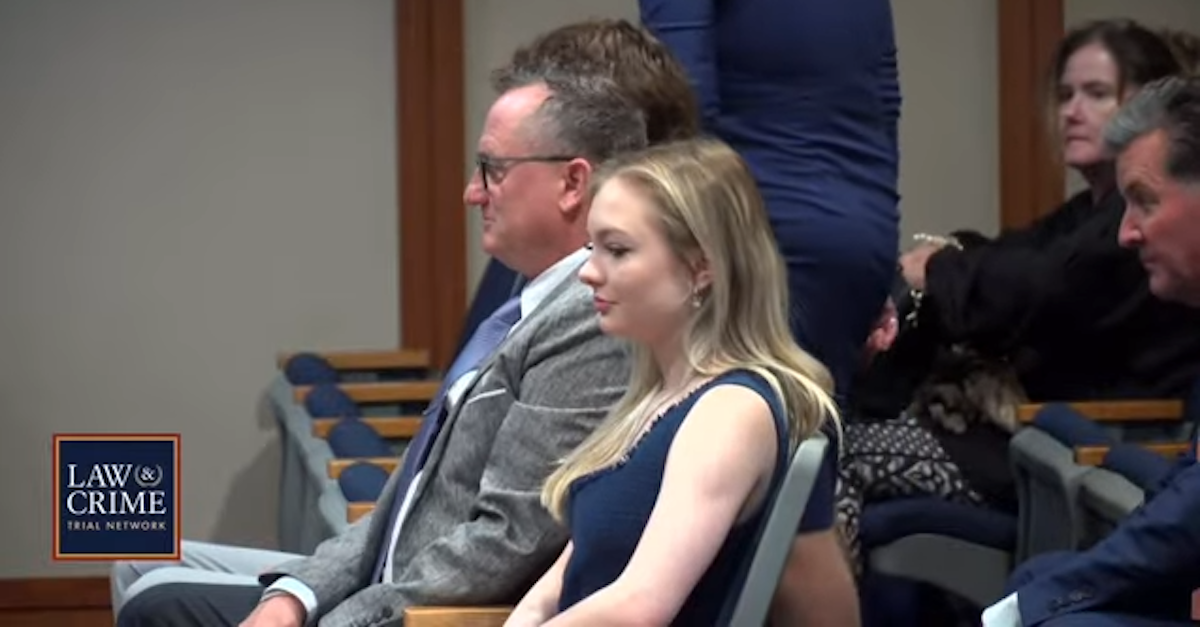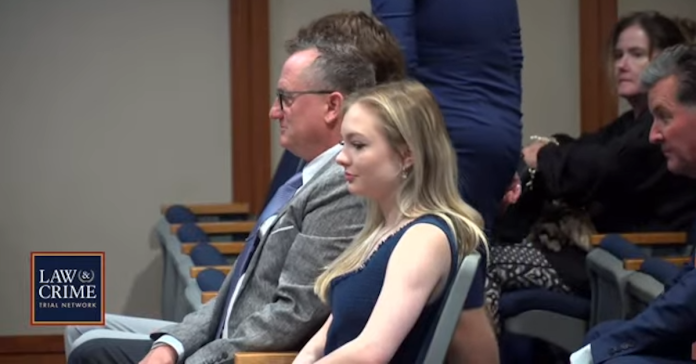The Florida hospital that was recently found civilly liable for medically kidnapping a young girl and driving her mother to suicide was in court again on Friday, arguing for a new trial based primarily on claims of juror bias and misconduct.
The ordeal suffered by then-10-year-old Maya Kowalski and her family is famously depicted in the critically acclaimed Netflix documentary, “Take Care of Maya.” A roughly two-month-long civil trial earlier this year reprised the claims made in that film against the hospital for the way staff there treated the chronically ill girl — and then some — including her false imprisonment and battery.

Maya Kowalski in court on Dec. 6. (Law&Crime screenshot)
In November, a six-person jury in Sarasota County unanimously found Johns Hopkins All Children’s Hospital in St. Petersburg liable for the incidents leading up to the January 2017 death of Beata Kowalski, 43. Jurors awarded the Kowalski family far more than they even requested — a total of $261 million in compensatory and punitive damages to make up for their loss and to punish the hospital.
Now, All Children’s is asking the judge overseeing the case for a new trial. The request, in a series of motions filed in recent weeks, is based on various incidents of alleged misconduct by one juror in particular.
Accusation that Juror No. 1 misrepresented material information
The hospital’s attorney argued that it is the duty of jurors to “adequately and honestly disclose during voir dire any material issue that could affect their jury service.” The defendant asserted that Juror No. 1 had three material omissions or misrepresentations “based on his verdict form.”
First, the juror lied when he said he had never been the victim of a crime, according to the defendant. Since that time, the defendant said it discovered that the juror and his wife in March 2016 “filed an affidavit and prosecuted their stepson,” claiming he had threatened to kill them.
“This could not possibly be something a juror would forget to disclose,” the defendant’s attorney told the court. He added that if the hospital’s legal team had known, they would have had follow-up questions and likely would have used a preemptory challenge during jury selection.
Second, the hospital claimed that Juror No. 1 in 2002 was “served with an injunction for domestic violence of there’s a sworn affidavit of child abuse.” While the file is sealed, the hospital claimed that the juror had a duty to disclose the incident, which would have led to a cause challenge keeping him off the jury.
Third, when reviewing a list of potential witnesses, one of the names listed was an attorney representing the juror’s wife in divorce proceedings. This, the hospital argued, entitles its attorneys to at least interview the juror regarding his response.
The judge asked whether the defendant had done follow-up questions with other potential jurors who said they had previously been the victim of a crime, and the attorney responded that he had not yet gone through all of the relevant records, but the attorney said he “absolutely” would have followed up on such an answer.
Juror No. 1’s alleged bias
The court then questioned the defendant regarding Juror No. 1’s alleged bias against a hospital employee named Sally Smith, specifically about how he wrote her name in a note penned during the trial. The hospital argued that the juror printed the letter “S” in the name with “sharp angles” in “a manner identical to the symbol of the Nazi Schutzstaffel.”
The court questioned why counsel failed to raise this issue when he first saw the note and why failing to do so didn’t effectively waive the issue. The defendant responded the distinct lettering wasn’t “glaringly obvious” at the time, saying neither they nor the court “fully appreciated” its meaning at the moment.
Juror No. 1’s alleged communications during the trial
Finally, the defendant argued that the social media postings of Juror No. 1’s wife — objectively pro-plaintiff — showed that the juror and his wife communicated about the case during the trial. Counsel specifically pointed to instances where the wife predicted that her husband would have questions for certain witnesses. The hospital also claimed that the juror’s wife posed the same questions as him on specific topics.
If granted an interview with the juror, counsel said they would need to find out what, if anything, the couple said to each other about the trial and requested some kind of inspection of their electronic devices to review their text messages.
Plaintiff’s Responses
The plaintiff’s attorney then offered a rebuttal, arguing that most of the defendant’s case is based on assumptions from a high-profile trial that was broadcast live. Essentially, the plaintiff argued that the defendant was portraying a series of easily explainable and inconsequential coincidences, then selling it to the court as a conspiracy.
The plaintiff then addressed the 2016 affidavit filed against the juror’s step-son, whom the plaintiff said was actually the step-son of the juror’s wife and that the incident took place before they were married and did not result in a follow-up, conviction, or any kind of violent crime being committed, referring to it as “a lot of grasping.”
Regarding the sharp angled “S” letters in the juror’s note, the plaintiff’s attorney took out a “demonstrative exhibit” — a vinyl printing of Kiss’ 1977 album “Alive II” in which the band’s name is clearly spelled with the similarly sharp angled “S” letters the juror used in his note.
“These letters are commonly used for a long time,” the plaintiff’s attorney argued. “It does not mean it’s a Nazi symbol.”
The plaintiff said that if there were to be a juror interview, it would have to be conducted by the judge, not the defendant’s attorney, and emphasized that allowing an inspection of the electronic devices belonging to the juror and his wife would be “unprecedented.”
The hearing ended with Carroll telling both parties that he will decide sometime next week whether there will be a juror interview. Additional issues, including JHAC’s request for a new trial, will not be decided until that decision is reached.
Colin Kalmbacher contributed to this report.
Have a tip we should know? [email protected]

